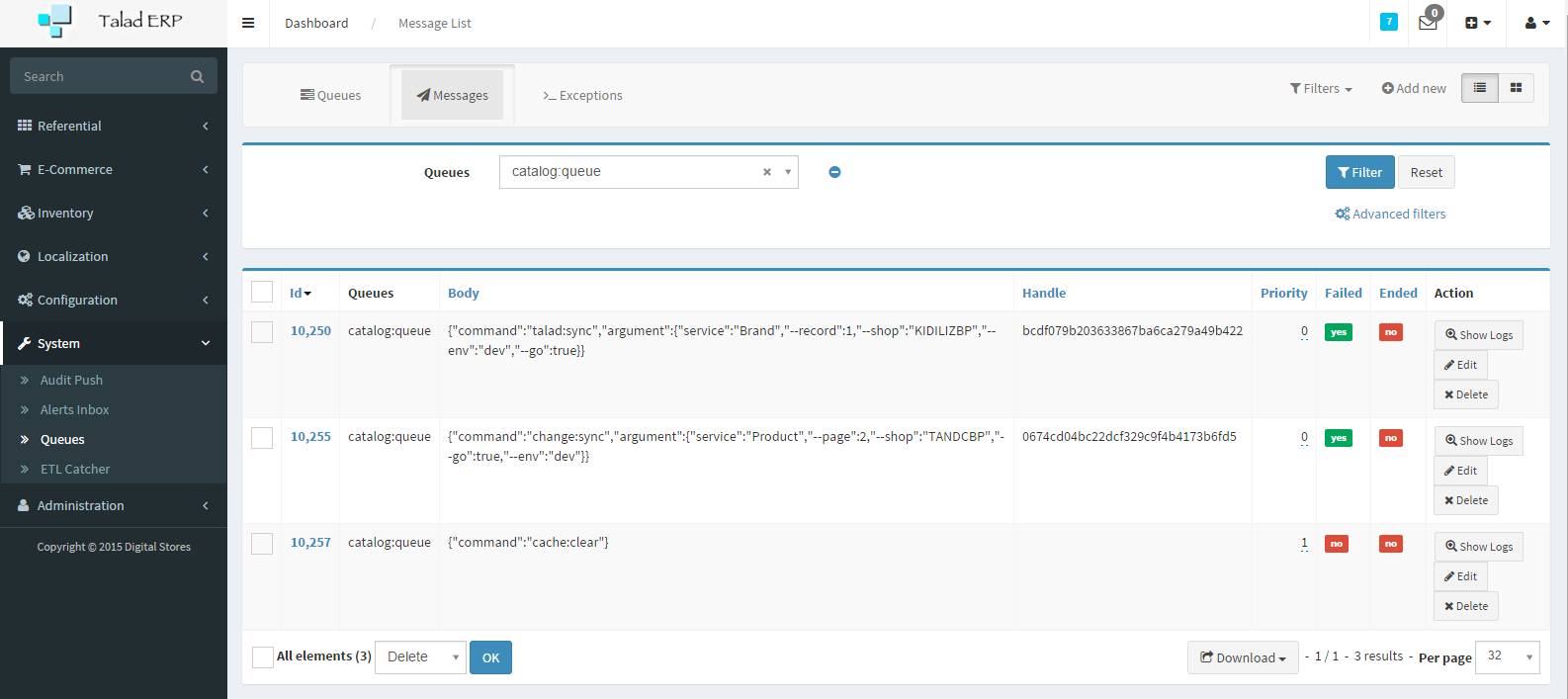Awesome
JobQueueBundle
This bundle provides the use of Zend Queue from Zend Framework. It allows your Symfony 2/3 application to schedule multiple console commands as server-side jobs.
See the Programmer's Reference Guide for more information.
Features:
- Manage multiple queues
- Schedule your Symfony commands
- Monitor messages and log exceptions
- Retry logic
- Prioritizing jobs
- RabbitMQ or database support
- Easy-to-use :)
Installation
Require heristop/jobqueue-bundle to your composer.json file:
{
"require": {
"heristop/jobqueue-bundle": "1.0.1",
"zendframework/zend-queue": "2.*@dev"
}
}
Load the bundle in AppKernel:
$bundles[] = new Heri\Bundle\JobQueueBundle\HeriJobQueueBundle();
If you use the Doctrine adapter, update your database:
app/console doctrine:schema:update --force
If you use the Amqp adapter, you may configure the connection in this way:
# app/config/config.yml
heri_job_queue:
amqp_connection:
host: localhost
port: 5672
user: guest
password: guest
Usage
First, define a message which contains the Symfony command to call. For instance, we choose to add the clear command in a queue named "queue1":
$queue = $this->get('jobqueue');
$queue->attach('queue1');
$queue->push([
'command' => 'cache:clear'
]);
You can also call commands with arguments:
$queue->push([
'command' => 'demo:great',
'argument' => [
'name' => 'Alexandre',
'--yell' => true
]
]);
Then, add the queue to listen in the configuration:
# app/config/config.yml
heri_job_queue:
enabled: true
max_messages: 1
# set a process_timeout (in seconds) if you want your commands to be killed
# when their execution time is too long (default: null)
process_timeout: 60
queues: [ queue1 ]
Note: The queue is automatically created, but you can also use the command-line interface in this way:
app/console jobqueue:create queue1
Listener Commands
Run the Listener
To run new messages pushed into the queue, execute this command:
app/console jobqueue:listen
Specify a specific Queue
You may specify which queue connection the listener should utilize (skipping configuration):
app/console jobqueue:listen queue1
Specify the Sleep Duration
You may also specify the number of seconds to wait before polling for new jobs:
app/console jobqueue:listen --sleep=5
Process the first Job on the Queue
To process only the first job on the queue, you may use the jobqueue:work command:
app/console jobqueue:work
Show Jobs
To see the pending jobs, run the command below:
app/console jobqueue:show [queue-name]
Failed Jobs
If a job failed, the exception is logged in the database, and the command is call again after the setted timeout (default 90 seconds):

To delete all of your failed jobs, you may use the jobqueue:flush command:
app/console jobqueue:flush [queue-name]
Jobs Priority
Jobs are executed in the order in which they are scheduled (assuming they are in the same queue). You may also prioritize a call:
$queue
->highPriority()
->push([
'command' => 'cache:clear',
]);
Jobs Monitoring
If you use the Doctrine Adapter, you may use Sonata Admin to monitor your jobs:
#
# more information can be found here http://sonata-project.org/bundles/admin
#
sonata_admin:
# ...
dashboard:
# ...
groups:
# ...
System:
label: System
icon: '<i class="fa fa-wrench"></i>'
items:
- admin.queue

Retry strategy
By default, number of excecution of failed messages is endless. If you use the Doctrine Adapter you may edit the max number of retries on queue table.
To retry all of your failed jobs, you may use this command:
app/console jobqueue:retry [queue-name]
If you would like to delete a failed job, you may use this command:
app/console jobqueue:forget [id]
Configure a daemon
The jobqueue:listen command should be runned with the prod environnement and the quiet option to hide output messages:
app/console jobqueue:listen --env=prod --quiet
To avoid a memory leak caused by the monolog fingers crossed handler, you may configure the limit buffer size on config_prod.yml:
# app/config/config_prod.yml
monolog:
handlers:
main:
type: fingers_crossed
action_level: error
handler: nested
buffer_size: 50
Linux ProTip:
To run the command as a service, edit jobqueue-service shell in Resources/bin.
Set the correct PROJECT_ROOT_DIR value, and copy this file to /etc/init.d.
Then use update-rc.d:
cp jobqueue-service /etc/init.d/jobqueue-service
cd /etc/init.d && chmod 0755 jobqueue-service
update-rc.d jobqueue-service defaults
To remove the service, use this command:
update-rc.d -f jobqueue-service remove
If the service stopped suddenly, you may use supervisord to restart it automatically.
A sample config might look like this:
[program:jobqueue-service]
command=/usr/bin/php %kernel.root_dir%/console jobqueue:listen --env=prod
directory=/tmp
autostart=true
autorestart=true
startretries=3
stderr_logfile=/var/log/jobqueue-service/jobqueue.err.log
stdout_logfile=/var/log/jobqueue-service/jobqueue.out.log
user=www-data
~

